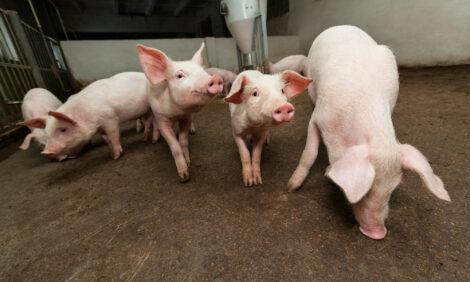



US Ag Industry Moves Forward Despite Uncertainties
US - As uncertainty looms across the United States as to when the government shutdown will end, the uncertainty has impacted the agricultural industry and those wanting to make trading decisions for their crops and livestock."I don’t know how long this will last, but context is important," said Glynn Tonsor, associate professor and livestock economist for Kansas State University.
"The sun still came up today. Feeder cattle are being sold. Corn is being harvested. Those kind of physical activities I don’t think are changing. What is changing, at least in the short term until the shutdown is resolved, is how we discover ag prices, how they’re reported, and how people make buy-sell decisions."
The US Department of Agriculture’s (USDA) entities are among those currently not functioning due to the shutdown. Even the USDA’s website is not available for use. The USDA’s Agricultural Marketing Service (AMS) is the entity responsible for facilitating the fair marketing of US agricultural products and reporting price averages.
Ag commodity traders rely on those unbiased numbers from the AMS, Professor Tonsor said. Some private companies develop cash numbers as well and might issue them for a fee, but many of those companies use AMS data to figure their numbers. Professor Tonsor points out that even AMS data isn’t free, as the AMS is a tax-paid service. But, due to the shutdown, the most recent cash numbers available for cattle, for example, are from 27 September.
Professor Tonsor said people should educate themselves about the origin of the data and the potential targeted audiences, if any, of private data companies. The AMS is viewed as an unbiased source, much like universities, he said. A private provider might show a rosier example of prices to cow-calf producers, for instance, if that’s its targeted audience.
"I don’t want to come across as an advocate for USDA, but I have made a point to try to raise awareness to ag producers that a lot of publicly gathered data gets repackaged, and folks like me and others end up bringing it to them," Professor Tonsor said.
"Understanding where that data comes from, how it’s collected and the fact that it isn’t collected for free, is very important."
How long the government shutdown will continue and how long commodity traders will go without base-reported prices is uncertain. Without the AMS data, it is evident that the marketplace is uneasy, but Professor Tonsor said the typical cow-calf producer who is going to sell his or her calves is probably still going to do it.
"We’re still going to find a price that makes transactions go forward, but the cost of that price discovery system, at least in the short term, has gone up," Professor Tonsor said.
"Everybody is adjusting to find this information somewhere else, and maybe it’s not as efficient. Not everybody has the same network. Not everybody has access to the same private data sources."
Tonsor said in addition to using private sources to obtain data, people should consult their personal networks and do some searching online to better understand the current markets.
Another problem that has developed out of this shutdown is gaps in historical perspectives of the markets. The feeder futures market, for example, has a cash settlement index that is based on prices reported from various parts of the country.
Professor Tonsor said because no information is being collected now, there won’t be the ability to build that index for the traditional way of settling the feeder cattle contract.
"We are definitely building gaps, some of which will not be resolved even if the shutdown ended right now," Professor Tonsor said.
"Every day, every minute that goes by, there is something that is not being captured that won’t be back-filled. Some things that are being captured won’t be back-filled because of computer systems being down. So you have gaps in the data series."
As the shutdown continues, the agricultural industry can continue to lobby to put AMS reporters back to work, Tonsor said.






